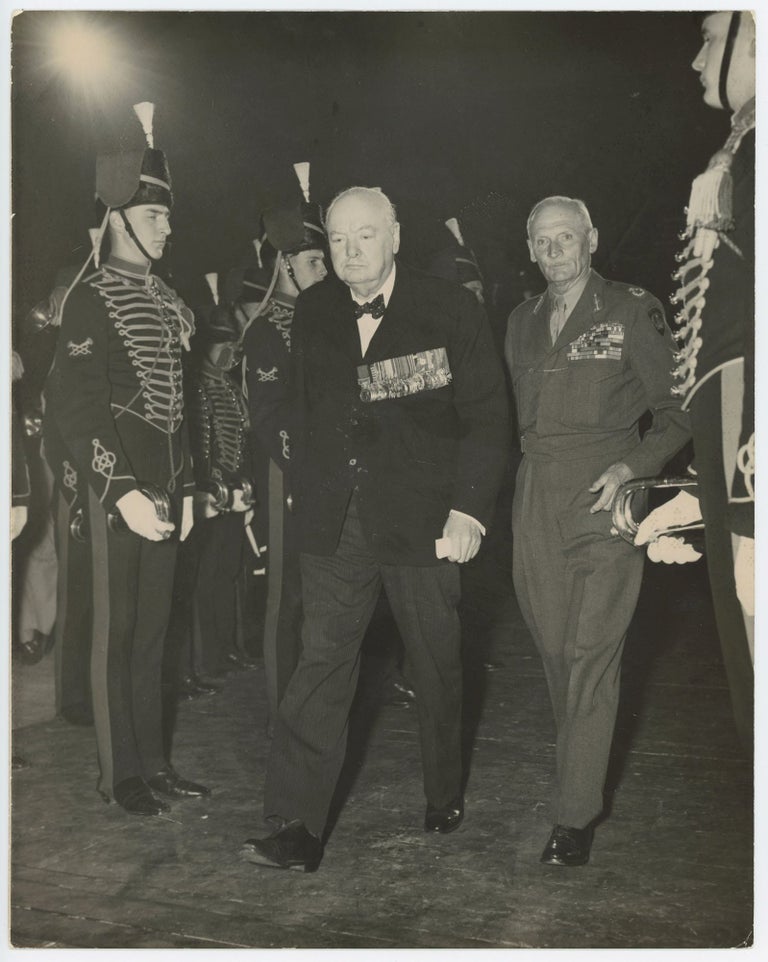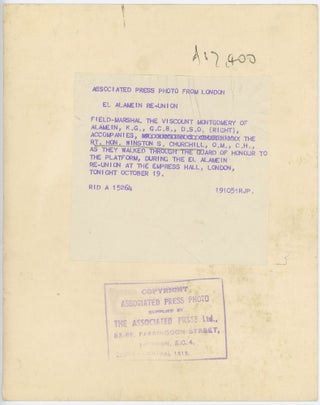EL ALAMEIN RE-UNION - An original press photograph of Winston S. Churchill and Field Marshal Montgomery at the El Alamein Reunion on 19 October 1951, a week before Churchill returned to 10 Downing Street for his second and final premiership
London: Associated Press Photo, 19 October 1951. Photograph. This original press photograph captures Winston S. Churchill and Field Marshal Montgomery on 19 October at the El Alamein Reunion, just a week before Churchill returned to 10 Downing Street for his second and final premiership. The gelatin silver print on matte photo paper measures 10 x 8 inches (25.4 x 20.3 cm). Condition is very good minus. The paper is clean, crisp, and free of scratches with some light wear to the edges and corners. The verso bears a copyright stamp from “Associated Press Photo” and a typed caption reading, “FIELD-MARSHAL THE VISCOUNT MONTGOMERY OF ALAMEIN, K.G, G.C.B., D.S.O. (RIGHT), ACCOMPANIES, THE RT. HON. WINSTON S. CHURCHILL, O.M., C.H., AS THEY WALKED THROUGH THE GUARD OF HONOUR TO THE PLATFORM, DURING THE EL ALAMEIN RE-UNION AT THE EMPRESS HALL, LONDON, TONIGHT OCTOBER 19.”
Field Marshal Bernard Law Montgomery, 1st Viscount Montgomery of Alamein, KG, GCB, DSO, PC (1887-1976) passed through Sandhurst "without distinction but without difficulty also" and began what would be fifty years in the British Army. "It was the First World War that changed Montgomery from a bumptious, querulous infantry subaltern, constantly at odds with authority, into a decorated company commander, outstanding staff officer—and trainer of men." The First World War showed Montgomery 'that the whole art of war is to gain your objective with as little loss as possible.' This edict made Montgomery "the outstanding British field commander of the twentieth century.”
Montgomery earned his fame in North Africa during the Second World War. In August 1942, Churchill gave Montgomery command of the Eighth Army, where Montgomery famously beat Rommel and oversaw defeat of Axis forces in North Africa, a critical first Allied victory. He went on to command the Eighth Army in Sicily and Italy.
The 1951 El Alamein Reunion was held in London with Churchill, Montgomery, and Eisenhower as the guests of honor, each addressing the gathered veterans in turn. Montgomery opened, praising Churchill and Eisenhower as the greatest Englishman and the greatest American of their time. Churchill followed, giving a typically Churchillian speech (“we are marching forward in good company”, etc.). Eisenhower and Montgomery both escorted the wartime Prime Minister back to his seat, linking arms with him between them. Eisenhower closed the addresses with a more explicit link between the past war and present international Cold War. “If we have got to meet the plaguing terrible problems of peace. If we have the courage of the victors of Alamein, that is all there is to it… War days were great days, but we are living in greater, because we are struggling to preserve the peace for ourselves and our children.” (Northern Whig, 20 October 1951)
That struggle would fall again to Churchill and Eisenhower quite literally. Just a week later, on 26 October 1951, Churchill’s conservatives won the General Election returning Churchill to 10 Downing Street for his second and final premiership. Montgomery wrote to Churchill that day “Thank God” as soon as the news was known. “At last we have you back again and in charge of the ship.” Eisenhower would be elected President of the United States in November 1952, assuming the presidency in January 1953. Montgomery and Churchill remained friends, but Montgomery’s later years proved less elevated than those of Churchill and Eisenhower. Montgomery’s uncharitable accusations in his postwar memoirs lost him the friendship of Eisenhower and forced Montgomery to publicly apologize to a fellow Field Marshal. Montgomery earned further criticism for declaring support for Apartheid and praising communist Chinese leadership. Item #005381
Price: $180.00


